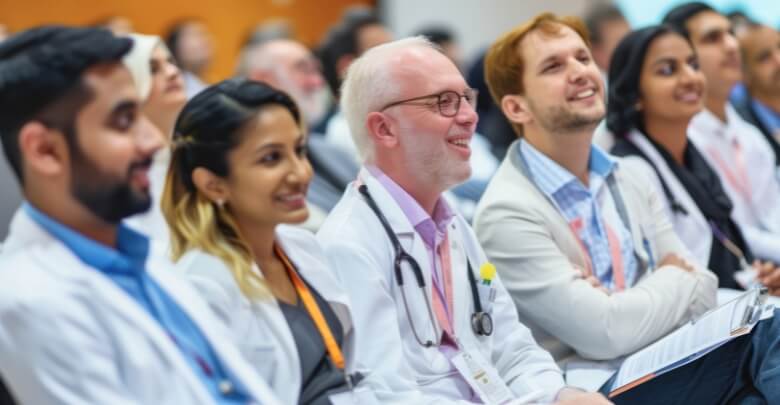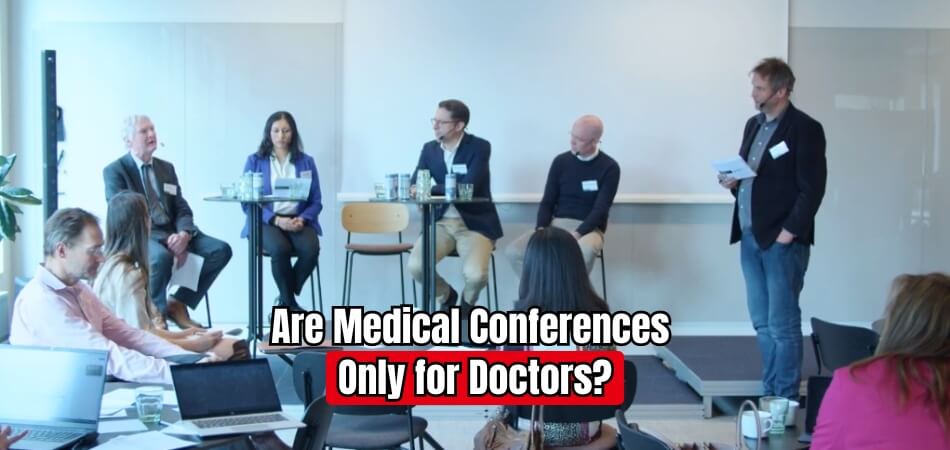The role of medical conferences is essential in the continuous evolution of healthcare practices and policies, providing an important forum for sharing the latest research. However, new attendees who want to attend medical conferences have a common question: Are medical conferences only for doctors?
No, medical conferences are not only for doctors. These conferences are extremely inclusive, attracting healthcare professionals from every field. There’s a wide range of attendees, from nurses and researchers to educators and administrators, who share knowledge, network, and discuss the latest innovations.
Want to know how these conferences can benefit healthcare professionals and what opportunities they offer? Check out this article and learn more about the exciting field of medical conferences.
What Is the Core Purpose of A Medical Conference?
The core purpose of a medical conference is to develop medical knowledge and encourage innovation within the healthcare sector. Professionals come together to discuss recent research findings, clinical trials, and innovative technologies. This collective effort improves patient care and treatment methodologies across various specializations.
During these conferences, networking is also crucial. The exchange of experiences and insights between doctors, specialists, and healthcare providers contributes significantly to professional development and collaboration. This interaction often leads to partnerships that go beyond the participants’ individual capabilities and increase healthcare quality.
Many foreign participants attend these globally hosted medical conferences and bring a wealth of unique perspectives and experiences. In this way, international participation enriches the dialogue and contributes to a deeper knowledge of global health issues. Such diversity ensures that the solutions and innovations developed are adaptable and effective worldwide.
Are Medical Conferences Only For Doctors?
No, medical conferences are not only for doctors. They are collaborative events designed for a wide range of healthcare professionals. Countries like Canada and the USA are hosting several medical conferences over the years. The goal of medical conferences is to share knowledge, encourage innovation, and facilitate networking among multiple participants. Below is detailed information about who can attend this prestigious conference.
Doctors and Physicians
Various specialties of doctors attend to stay up to date on the latest treatments and research in their fields. They engage in discussions, contribute to panels, and often lead sessions. Sharing clinical experiences helps them gain insights into practical applications. As a result of this participation, they can continue their professional development.
Nurses
Nurses benefit greatly from medical conferences. They learn about the latest patient care techniques and nursing advancements. Networking with peers provides them with opportunities for career advancement. They often return with valuable skills that can be applied to their work environments.
Healthcare Administrators
These conferences focus on the operational aspects of healthcare delivery. During the course, they look at advances in healthcare technology and management practices. Their job is to stay on top of regulatory changes and compliance requirements. Having this kind of knowledge will make healthcare facilities run more efficiently.
Medical Researchers
Researchers present their findings and learn about advancements from their peers. This exchange of knowledge drives further innovation and collaboration in medical science. In Canadian medical conferences, they also look for potential funding opportunities and partnerships. Discussions often focus on future research directions and clinical applications.
Medical Students
This conference provides students with an opportunity to learn from experienced professionals about current trends and knowledge. As a result, they can network and find mentors in their fields of interest.
Their educational path is shaped by exposure to the latest research and clinical practices. Oftentimes, they volunteer to assist with conference logistics.
Healthcare Industry Representatives
Companies from the pharmaceutical, medical equipment, and related sectors showcase their products at medical conferences. Additionally, these companies gather feedback from healthcare professionals. Insights gained from these interactions are instrumental in developing future products and refining marketing strategies.
This overview highlights the diverse range of professionals who benefit from attending medical conferences, demonstrating that these events are not exclusive to doctors. Engaging with upcoming medical conferences in Canada 2024 can provide valuable opportunities for collaboration and knowledge exchange among all healthcare professionals. By participating in these events, attendees can upgrade their skills and stay informed about the latest advancements in their respective fields.
What Draws Attendees to Involved in a Medical Conference?
There’s no denying that medical conferences are essential events for all kinds of participants. Attendees are drawn by its unique offers and benefits. Here’s what typically draws attendees to participate actively in such conferences.
Continuing Education
It’s a great way for attendees to earn continuing education credits. These credits are necessary to maintain licensure and certification. Learning the latest practices ensures their knowledge remains current. This commitment is vital for healthcare career progression.
Opportunities for Networking
Attendees meet professionals from diverse healthcare backgrounds. These interactions often lead to shared insights and solutions to common problems. Building a professional network is a necessity for collaborative opportunities. Making contacts here can have long-term effects on careers.
Latest Innovations
Attendees explore the newest medical technologies and treatments at a medical conference where vendors display the latest medical devices and software. Also staying on top of emerging trends can help attendees stay competitive, and this knowledge is a must for improving patient care.
Research Presentations
Whenever researchers present new findings, they get immediate feedback from their peers. These sessions are essential for academic and clinical advancements. Presenting research can also boost attendees’ recognition and credibility. This is a great way to make a difference in the medicine sector.
Professional Development
Workshops and seminars focus on skill enhancement and professional growth. Skills acquired are directly applicable to medical practice. Learning the importance of conferences for doctors is crucial, as professional development sessions are customized to various specialties. They help professionals refine their abilities and methods.
Inspiration and Renewal
Participants enjoy conferences because they provide a break from their daily routine and reenergize them. Professionals are inspired when they hear about successful cases and innovations, and as a result, they return to work motivated to implement new ideas. Also, these events inspire medical students to pursue medical careers.
How to Prepare for Your First Medical Conference?
The experience of attending your first medical conference is both exciting and invaluable for improving your professional development. With the right preparation, you will be able to maximize your learning and networking opportunities. Here’s a step-by-step instruction to help you manage your first medical conference with confidence.
Step 1: Register for the Conference
Start by registering with a reputable conference organizing website as early as possible. Early registration often comes with benefits such as discounted rates and easier access to limited-capacity sessions. Also, confirming your attendance early allows you to receive updates and prepare for specific events.
Step 2: Research the Agenda
Once you have registered, review the conference agenda thoroughly. Identify sessions that align with your interests and professional goals. This helps you prioritize your time effectively and prevents you from missing important presentations. You can maximize your conference experience by planning your schedule in advance.
Step 3: Update Your Professional Materials
Keep your business cards and professional profiles up-to-date. Make sure you have plenty of business cards available for networking, and update your LinkedIn profile or professional biography to establish new connections. These materials are essential as they represent your professional image to new contacts.
Step 4: Plan Your Travel and Accommodation
Plan your travel and lodging well in advance. By staying close to the conference venue, you can reduce travel time and stress. Make sure there are public transportation options and parking options nearby. You can focus more on the event when travel logistics are smooth.
Step 5: Set Networking Goals
Based on the conference agenda and attendee list, define specific networking goals. Prepare to engage with selected professionals or experts. You can add value to your interactions by having predefined questions or discussion points. Getting connected can open up a lot of career opportunities.
Step 6: Pack Smart
Pack essential items such as notepads, pens, a laptop or tablet, and enough business cards. Make sure you have a portable charger for your devices and dress professionally for the conference. Comfort is key, so wear shoes that support you through long days.
Step 7: Follow Up After the Conference
Organize the contacts and materials you’ve collected once the conference concludes. Reach out with follow-up emails to your new contacts to express appreciation and interest in ongoing interaction. Timely follow-ups convey professionalism and build lasting professional relationships.
Benefits of Attending Medical Conferences for Non-Doctors
Medical conferences offer numerous advantages not just for doctors but also for other healthcare professionals. Here are some key benefits for non-doctors attending these important events:
Enhanced Knowledge and Skills
Attending medical conferences allows non-doctors to learn about the latest advancements in healthcare. Workshops and sessions cover specialized topics relevant to their roles. This ongoing education helps them stay current in a rapidly evolving field.
Networking Opportunities
Conferences provide valuable chances to network with peers and industry leaders. Non-doctors can build relationships with professionals from various backgrounds. These connections can lead to future collaborations and open doors for career advancement.
Inspirational Keynote Speakers
Many conferences feature keynote speakers who share valuable experiences and insights. Listening to leaders in the field can inspire non-doctors to adopt new strategies in their practice. This motivation can lead to improved patient care and professional satisfaction.
Continuing Education Credits
Non-doctors can often earn continuing education credits by attending conferences. These credits are crucial for maintaining licensure and certifications in many healthcare professions. Participating in these events ensures that they meet their professional requirements.
Access to Medical Conference Opportunities for Nurses
For nurses, attending medical conferences offers targeted learning opportunities. They can gain insights into new practices and technologies through these medical conference opportunities for nurses, ultimately improving patient care. Overall, these conferences are essential for professional growth in healthcare, benefiting all attendees.
Frequently Asked Questions
This section addresses common inquiries regarding the accessibility and inclusivity of medical conferences. Knowing these aspects can help potential attendees explore their options effectively.
Are Medical Conferences Open to International Participants?
Yes, medical conferences welcome participants from around the world, enriching discussions with diverse global perspectives and experiences. This inclusivity supports collaboration and innovation in the medical field. Attending alongside international colleagues can provide valuable insights that better your perception of global health issues.
Can Attendees Present Their Research at Medical Conferences?
Absolutely! Many conferences offer opportunities for attendees to present their research through abstract submissions and poster or oral presentations. This is a fantastic way to showcase your work and receive feedback from peers and experts. Presenting at a conference can also elevate your professional profile and open doors for future collaborations.
Are There Virtual Options for Attending Medical Conferences?
Yes, in addition to in-person attendance, conference organizers increasingly offer virtual platforms. These options provide flexibility for participation, allowing remote access to sessions and networking opportunities. Virtual attendance ensures that those unable to travel can still engage with the content and connect with other professionals.
Does the Medical Conference Industry Practice Sustainable Practices?
Medical conferences are increasingly adopting sustainable practices such as paperless registration, recycling programs, and eco-friendly venue choices to minimize environmental impact and promote sustainability in healthcare events.
Are There Opportunities for Funding and Grants at Medical Conferences?
Yes, some conference organizers feature sessions or networking opportunities where attendees can learn about funding opportunities, grants, and scholarships available to support research and professional development.
Bottom Line
No rule says medical conferences are exclusively for doctors. They are open to a wide range of healthcare professionals and normal attendees. This inclusivity contributes to the learning experience and provides insights and developments from various specialties.
Despite the diverse roles and backgrounds of the attendees, the question, “Are medical conferences only for doctors?” clearly finds an answer. These events are hot spots for innovation, where knowledge and experiences are shared widely across the healthcare spectrum.
As a result of the convergence of global medical expertise and collaborative opportunities, participants benefit from the unique experience. Such environments contribute to not only professional growth but also the advancement of healthcare practices on a global scale.








